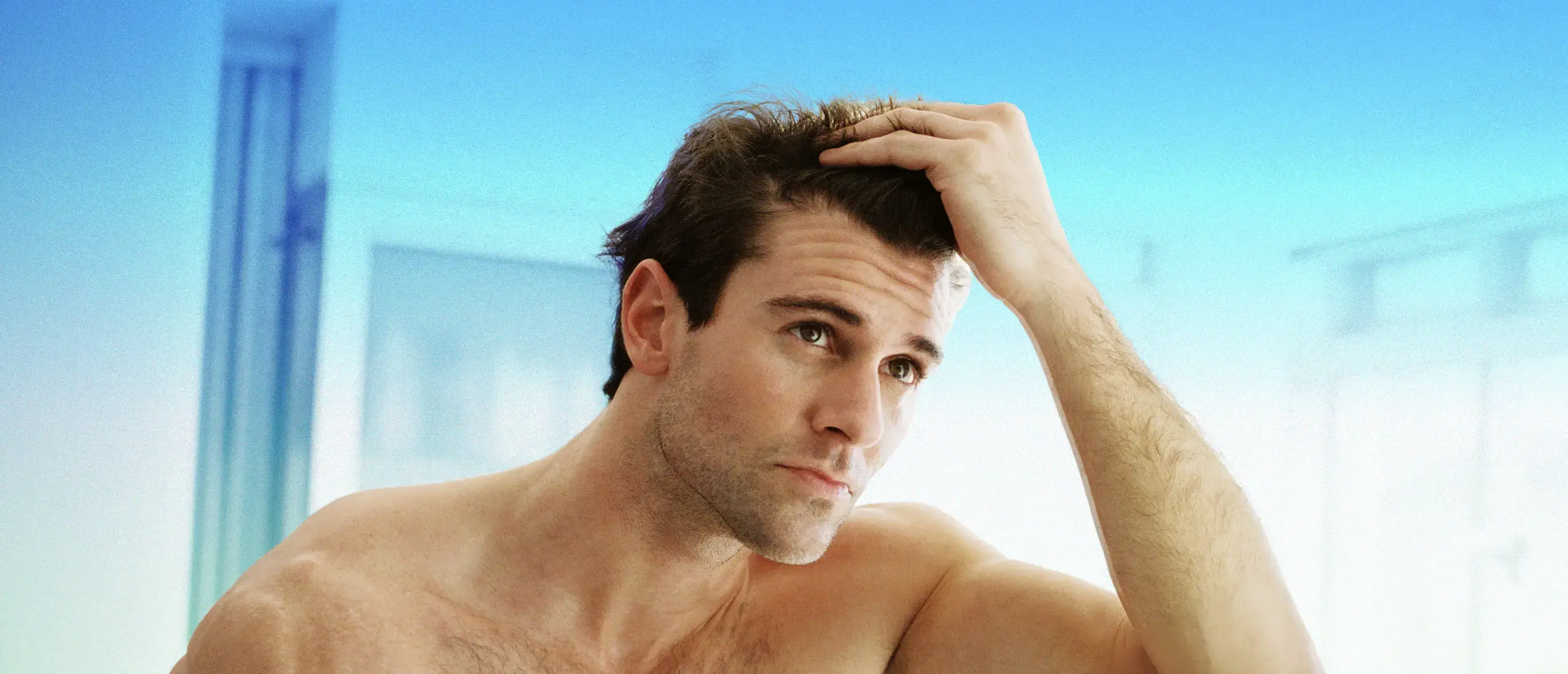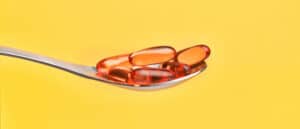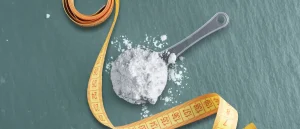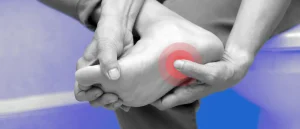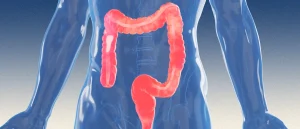Does Creatine Cause Hair Loss? Here’s What the Science Says
- By Taneia Surles, MPH
- November 16, 2023
Fast Facts
- There is no definitive, research-supported link between creatine supplementation and hair loss.
- But, some research has found creatine may increase DHT levels in men, which is often associated with hair loss. The science supporting this claim is conflicted at best.
- If you believe you’re predisposed to hair loss or notice signs of hair loss after beginning a creatine supplementation protocol, consider speaking with your dermatologist about next steps
What’s one thing that many men fear (other than erectile dysfunction)? Hair loss.
We know that thinning hair or hair loss is bound to happen as we age—in fact, about 70 percent of men will lose their hair as they age, and 25 percent of bald men notice the first signs of hair loss (also known as alopecia) before age 21 (1).
So, with those statistics, hair loss is somewhat expected for men. Men lose their hair for various reasons, which we’ll get into later, but one potential risk factor has gained more attention over the years: creatine.
Some people believe their hair loss is accelerated or caused by consuming creatine, an amino acid.
To find out whether this amino acid is causing you to shed your precious tresses, we’ve decided to dig into the research ourselves and speak with an expert in the field to get the truth. Here’s what you should know.
Our Experience
Hone Health is a team of health-obsessed journalists, editors, fitness junkies, medical reviewers, and product testers. To ensure we deliver you research-backed information on what creatine does and does not do regarding hair loss, we’ve spoken to a board-certified dermatologist and reviewed several research studies and well-respected medical pages.
What Is Creatine?
Before discussing the link (or lack thereof) between creatine and alopecia, you probably need to know what it is.
“Creatine is a substance that stems from meat and fish and comes from the liver, kidneys, and pancreas,” says Hamdan Abdullah Hamed MBChB, a board-certified dermatologist and co-founder of PowerYourCurls.com. “It is converted into creatine phosphate or phosphocreatine and stored in the muscles, where it is used for energy.”
If you aren’t sure what amino acids are, they are molecules that come together to form protein. Both amino acids and proteins are considered the “building blocks of life,” which should let you know their importance (2).
As Hamed mentions, creatine is responsible for supplying energy throughout your body, which can be beneficial when exercising or just improving your overall health in general.
Unsurprisingly, many gym bros love this stuff, so they use it as a dietary supplement to boost their performance.
“For some people, they take creatine in the form of supplements to increase strength, improve performance, and help keep the minds sharp,” Hamed adds. Creatine supplements seem fairly safe to use, but more research is necessary to understand their long-term effects (3).
What Are The Benefits of Taking Creatine?
According to Hamed, taking creatine may help:
- Improve exercise performance
- Help in recovery after high-intensity exercise
- Increase muscle mass
- Prevent or reduce severe muscle injuries
“[Creatine] helps athletes tolerate more intense activity and reduce dehydration and cramping, minimize muscle tightness, including muscle strains and pulls,” Hamed adds.
Creatine supplements may also appeal to vegetarians too. “Vegetarians may also take creatine supplements to promote muscles because creatine supplements are not sourced from animal-based ingredients,” he says.
Like anything you consume, some risks are associated with taking creatine supplements.
The side effects of creatine supplements may include: (4)
- Muscle cramps
- Diarrhea
- Dehydration
- Nausea
- Seizures
Can Creatine Cause Hair Loss?
At this point, you’re probably wondering, “How can this seemingly healthy supplement lead to hair loss?” The first clue is DHT.
What is DHT?
Before showing you the evidence, you need to know what DHT is. DHT or dihydrotestosterone is a hormone and androgen responsible for stimulating the development of male sexual characteristics, including facial, body, and pubic hair and prostate growth (5).
For some men, high levels of DHT can lead to male pattern baldness by shrinking the hair follicles and shortening the length of the hair growth cycle. Other conditions that can arise from high DHT levels include benign prostate hyperplasia (BPH) and prostate cancer (5).
DHT comes into play when discussing the relationship between creatine and hair loss largely due to a single 2009 study, discussed below, with results that haven’t been replicated since (6).
Now, let’s see what our trusted expert and the research says.
What the research says about creatine and hair loss
Hamed simply states that creatine and hair loss is a “huge myth” and points to one study as proof.
“A study showed that some rugby players who had creatine intake started with DHT levels 23% lower than the placebo group,” Hamed explains. “The DHT levels started low and remained low.” (7)
However, after taking creatine for seven days, the study mentions a 56% increase in DHT levels among players. Still, the researchers did not explore the potential connection between the supplement and hair loss, so there’s room for speculation.
But we do know that high DHT levels may cause hair loss—so is this how people connect creatine and hair loss? Probably.
There are 12 other studies that examined the effects of creatine supplementation on DHT and other types of testosterone. Ten of these studies revealed no changes in testosterone levels—so there’s definitely some mixed research on creatine (6).
Currently, with the limited evidence available, there’s no proof of a direct link between creatine and hair loss.
Is Hair Loss from Creatine Permanent?
If you’re worried that creatine is causing hair loss—Hamed recommends you immediately stop taking the supplement to allow your hair to grow back.
If you have a dermatologist, they’ll likely recommend different treatment options to increase hair growth, which may include: (8)
- Topical minoxidil
- Finasteride
- Hair transplant
- Platelet-rich plasma (PRP)
If your head is spinning from the mixed evidence—you’re not the only one. This is certainly a topic that needs to be further explored.
“There is not enough evidence to tell that creatine causes hair loss,” Hamed says. “But if you experience it, it’s best to avoid the supplement and consult your doctor about using it or maybe use an alternative to the supplement.”
What Can Cause Hair Loss?
Since creatine is likely not the cause of hair loss for men, what is?
According to Hamed, hair loss can occur due to “aging, genes, and changes in testosterone. However, heredity is the common cause of baldness.”
If you’re dealing with alopecia, speak with your healthcare provider to get a proper diagnosis and start treatment.
The Bottom Line
The science around creatine and hair loss is muddied, but there is no definitive link between one and the other. If you are worried about creatine causing or accelerating hair loss, consider speaking with your dermatologist for intervention options.
References
1. Cleveland Clinic (2021). Why Do Men Go Bald? And Is There Anything You Can Really Do About It?
https://health.clevelandclinic.org/why-do-men-go-bald-and-is-there-anything-you-can-really-do-about-it/
2. MedLine Plus (2023). Amino acids. https://medlineplus.gov/ency/article/002222.htm
3. Butts, Jessica et al (2018). Creatine Use in Sports. https://www.ncbi.nlm.nih.gov/pmc/articles/PMC5753968/
4. American Academy of Orthopedic Surgeons. Creatine Supplements. https://orthoinfo.aaos.org/en/staying-healthy/creatine-supplements/
5. Kinter, Kevin J. et al (2023). Biochemistry, Dihydrotestosterone. https://www.ncbi.nlm.nih.gov/books/NBK557634/
6. Antonio, Jose et al (2021). Common questions and misconceptions about creatine supplementation: what does the scientific evidence really show?
https://www.ncbi.nlm.nih.gov/pmc/articles/PMC7871530/
7. van der Merwe, Johann (2009). Three weeks of creatine monohydrate supplementation affects dihydrotestosterone to testosterone ratio in college-aged rugby players. https://pubmed.ncbi.nlm.nih.gov/19741313/
8. American Academy of Dermatology Association. words. What is male pattern hair loss, and can it be treated? https://www.aad.org/public/diseases/hair-loss/treatment/male-pattern-hair-loss-treatment



